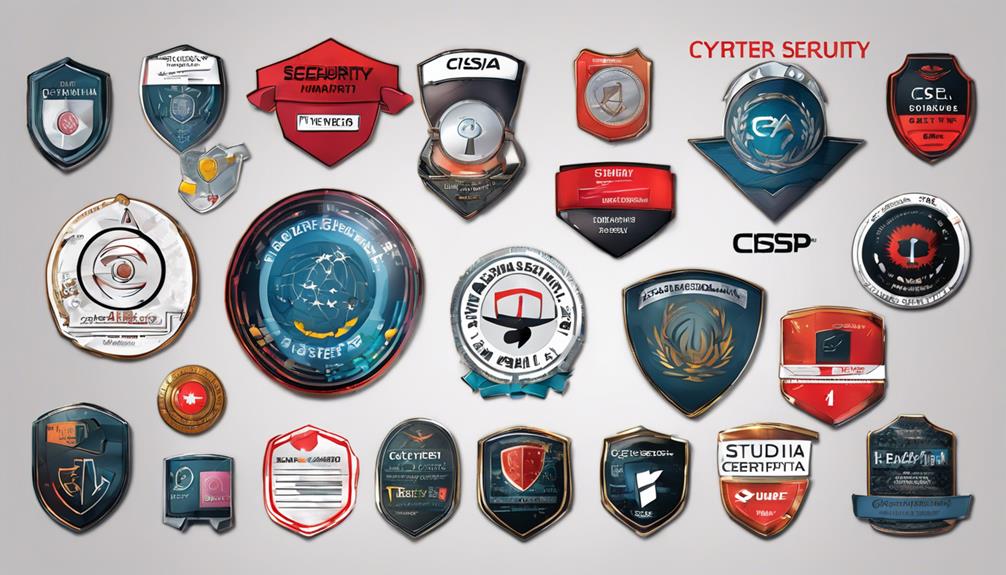Understanding personal interests and career aspirations are key in choosing between a diploma in Cyber Security or Ethical Hacking. Cyber Security equips individuals with technical skills to combat cyber threats like phishing, while Ethical Hacking involves identifying vulnerabilities through penetration testing. Cyber Security focuses on safeguarding organizations, whereas Ethical Hacking specializes in penetration testing roles. Both fields require continuous learning due to evolving threats. Certification courses like CEH and CISSP enhance career prospects. Industry demand for cybersecurity professionals is high, with lucrative salary potential and various career advancement opportunities. Personal alignment with the field's nature determines career satisfaction and success.
Key Takeaways
- Choose Cyber Security for overall protection of systems and data.
- Opt for Ethical Hacking for specialized penetration testing skills.
- Consider personal interests and career goals.
- Evaluate industry demand and job growth projections.
- Pursue relevant certifications for desired career paths.
Career Paths and Opportunities Comparison
When evaluating career paths and opportunities between cyber security and ethical hacking, it is important to consider the evolving landscape of digital threats and the projected growth in the cybersecurity market.
Ethical hacking careers offer a unique avenue for individuals looking to explore deeply into cybersecurity skills while maintaining an ethical approach towards combating cyber threats. The job growth in the cybersecurity field has been remarkable, with a 350% increase in global positions from 2013 to 2021, indicating abundant job opportunities for those with expertise in ethical hacking.
Career development in ethical hacking involves specialization in areas such as penetration testing, vulnerability assessment, and forensic analysis. Regular upskilling is vital in this field to stay abreast of the latest technologies and threats.
Additionally, networking through conferences and meet-ups can open doors to senior roles and other IT positions, making ethical hacking a promising career path in the dynamic cybersecurity market.
Required Certifications Overview

In the domain of cybersecurity and ethical hacking, obtaining relevant certifications is a vital step towards demonstrating expertise and staying competitive in the field. When pursuing a cybersecurity career, certifications such as Certified Ethical Hacker (CEH), CompTIA Security, and Certified Information Systems Security Professional (CISSP) are highly valued by employers.
These certifications authenticate the skills of ethical hackers and cybersecurity professionals, offering global recognition and showcasing a commitment to continuous learning. Accredited institutions provide thorough certification courses that cover various aspects of systems and networks security.
Additionally, certifications in penetration testing are essential for white hat hackers who specialize in identifying vulnerabilities within systems and conducting simulated attacks to improve security measures. By obtaining these certifications, ethical hackers help organizations enhance their cybersecurity posture and protect sensitive data from malicious threats.
Key Differences in Job Roles

Ethical hackers are primarily focused on identifying vulnerabilities in systems through simulated attacks, whereas cybersecurity professionals work on enhancing the overall security infrastructure.
While ethical hackers aim to strengthen security by addressing weaknesses and conducting penetration testing, cybersecurity experts are responsible for protecting data, monitoring threats, and recovering information in the event of breaches.
The key differences in job roles between these two fields lie in their specific job responsibilities and the skillsets required to excel in each position.
Job Responsibilities Comparison
A fundamental distinction in the roles of cybersecurity professionals and ethical hackers lies in their primary objectives and approaches towards securing digital assets.
- Ethical hackers focus on identifying security vulnerabilities through techniques like penetration testing and recommending solutions to reinforce security measures.
- Cybersecurity experts concentrate on fortifying security systems, overseeing network integrity, and safeguarding confidential data from potential breaches.
- Ethical hackers aim to enhance network safety by pinpointing vulnerabilities and strengthening security systems.
- Cybersecurity professionals prioritize protecting data integrity, thwarting unauthorized access attempts, and managing security incidents that may occur post-breach.
- Ethical hackers utilize methods such as reconnaissance, scanning, gaining access, maintaining access, and reporting vulnerabilities to bolster security measures effectively.
Understanding these key differences in job responsibilities is important for individuals considering a career path in either cybersecurity or ethical hacking, as it helps delineate the unique contributions each role makes towards maintaining a secure digital environment.
Skillset Requirements Analysis
Professionals in cybersecurity and ethical hacking roles differentiate themselves through distinct skillset requirements essential for executing their job responsibilities effectively. Ethical hackers primarily focus on identifying vulnerabilities and conducting penetration tests to enhance system security. This necessitates proficiency in tools such as Kali and certifications like Certified Ethical Hacker (CEH).
On the other hand, cybersecurity specialists work towards protecting data, managing network integrity, and analyzing security controls. They require skills in programming languages like Python, along with soft skills such as effective communication. Both roles demand continuous learning to stay abreast of evolving security trends.
Cybersecurity experts need to understand security controls deeply, while ethical hackers must possess practical experience in exploiting vulnerabilities. Ultimately, the choice between these paths hinges on individual preferences for hands-on technical work in ethical hacking or a broader scope of responsibilities in cybersecurity encompassing systems security and data protection.
Benefits of Each Diploma

When considering pursuing a diploma in Cyber Security or Ethical Hacking, individuals must weigh the unique benefits that each program offers for their career advancement.
- Cyber Security Diploma Benefits:
- Focuses on protecting organizations from various cyber threats like phishing and malware.
- Emphasizes network protection to safeguard sensitive information and infrastructure.
- Offers roles such as security analyst, providing a broad understanding of cybersecurity principles.
- Equips individuals with technical skills and certifications necessary for career advancement.
- Provides a solid foundation for individuals looking to combat evolving cyber threats in various industries.
- Ethical Hacking Diploma Benefits:
- Involves identifying vulnerabilities through penetration testing to enhance cybersecurity measures.
- Concentrates on actively seeking and fixing security weaknesses within systems.
- Focuses on specialized roles like penetration testing, allowing individuals to become experts in this field.
- Requires continuous learning and skill development to stay ahead of emerging cyber threats.
- Offers a pathway for individuals interested in the technical aspects of cybersecurity and ethical hacking practices.
Industry Demand Analysis

The escalating need for cybersecurity experts and ethical hackers across various industries reflects a significant gap in skilled professionals to address evolving cyber threats. Ethical hacking skills, including those of a Certified Ethical Hacker (CEH), are becoming increasingly sought after, with a 28% rise in job postings in the past year alone.
Industries such as finance, healthcare, and government organizations are particularly in need of cybersecurity analysts to enhance their cybersecurity strategy and protect against cyber criminals.
To meet this demand, professionals must possess a range of skills required for roles in cybersecurity, such as Certified Information Systems Security Professional (CISSP) certification. As the cybersecurity market is projected to grow substantially, individuals entering this field can expect significant growth potential.
With the global demand for cybersecurity professionals predicted to reach 3.5 million unfilled positions by 2021, pursuing a career in ethical hacking or cybersecurity offers promising opportunities for those equipped with the necessary expertise.
Salary Potential Evaluation

A significant trend in the cybersecurity field is the substantial increase in average salaries, reflecting the growing demand for skilled professionals in this sector.
To evaluate the salary potential in cyber security and ethical hacking, consider the following key points:
- The average salary for cybersecurity professionals in Ireland is €85,283, indicating lucrative earning potential in this field.
- Global job growth in cybersecurity positions has surged by 350% from 2013 to 2021, showcasing a high demand for skilled professionals.
- Career advancement opportunities in cybersecurity are abundant, including avenues for specialization, senior roles, and shifting into other IT positions.
- Regular upskilling and networking through conferences and meet-ups can greatly aid in career progression within the cybersecurity domain.
- Ethical hackers, particularly information security analysts, are experiencing a 33% growth projection between 2020 and 2030, highlighting the promising job outlook for individuals specializing in this area.
Personal Interest Considerations

Considering your personal interest in cybersecurity or ethical hacking is essential when determining the right career path for you. Ethical hacking involves legally penetrating systems to identify vulnerabilities and enhance security, requiring individuals with a strong sense of ethics and a thirst for problem-solving.
On the other hand, cybersecurity focuses on protecting systems and data from unauthorized access or attacks, appealing to those with a keen eye for detail and a passion for safeguarding information. To explore further into these fields, aspiring professionals can pursue certifications like Certified Ethical Hacker (CEH) or Certified Information Systems Security Professional (CISSP).
A Diploma in Ethical Hacking or Cyber Security can also provide a solid foundation for a career in either area. By aligning your personal interests with the nature of the work involved in cybersecurity and ethical hacking, you can make an informed decision that not only leverages your strengths but also fuels your career satisfaction.
Frequently Asked Questions
Which Is Better, Cyber Security or Ethical Hacking?
When comparing cyber security and ethical hacking, it is essential to understand that both play distinct yet interconnected roles in safeguarding systems. Cyber security encompasses broader security measures, while ethical hacking focuses on identifying vulnerabilities for strategic enhancements.
Is Diploma in Ethical Hacking Worth It?
Starting the journey of earning a diploma in ethical hacking is like maneuvering through a complex maze of cybersecurity challenges. With the rising demand for skilled professionals, the investment in this specialized education can indeed be worthwhile.
What Should I Learn First, Ethical Hacking or Cyber Security?
Understanding the fundamentals of cyber security is essential before delving into ethical hacking. Learning cyber security basics first provides a robust foundation for developing ethical hacking skills. Mastery of cyber security concepts enhances proficiency and effectiveness in ethical hacking practices.
Can You Become an Ethical Hacker With a Cyber Security Degree?
Yes, individuals can become Ethical Hackers with a Cyber Security degree. While the degree provides a solid foundation, additional technical skills and certifications like CEH may be necessary. Practical experience is also essential for success in Ethical Hacking roles.
Conclusion
To sum up, when weighing between a diploma in cyber security or ethical hacking, it is vital to take into account your career goals, interests, and the specific job roles you are interested in.
Both diplomas offer unique opportunities and benefits, so it is crucial to carefully assess your options before making a decision. By analyzing industry demand, salary potential, and required certifications, you can make an informed choice that aligns with your personal and professional aspirations.









